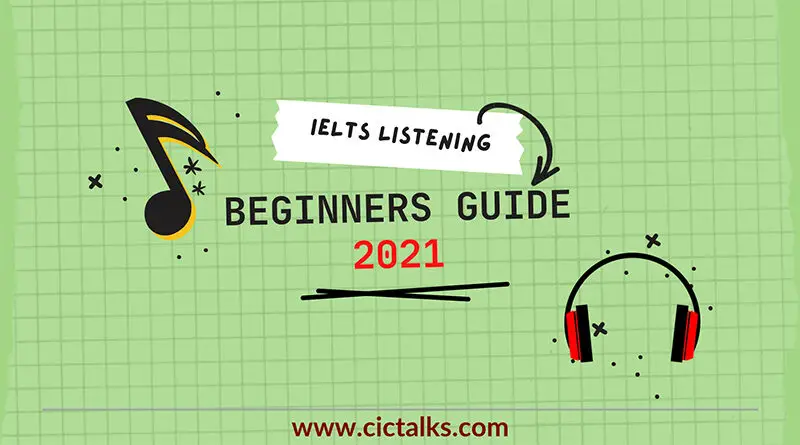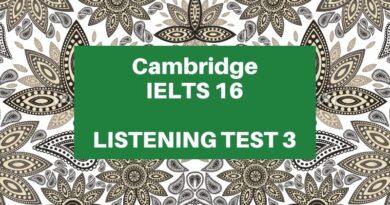IELTS Listening Exam Beginners Guide – Pattern & Tips
Are you going to take IELTS Listening Exam soon??
Then, we have a must-read article for you, after all, be better prepared than be very disappointed!
In the following article, we will cover the IELTS Listening exam procedure, Instructions, Exam pattern, Number of questions, Practice tests and Important tips to achieve high band scores on the test.
The procedure for IELTS Listening
- The listening module is the first part of the test you will do.
- It is recorded using a wide range of accents that are normally practiced in everyday english.
- Test takers are given a question booklet. Additional time is given to read the questions before each section is heard.
- As you hear the recordings in paper based IELTS, it is always suggested that you should write your answers on the question booklet itself.
- At the end of the fourth (last) section, you are given 10 minutes to transfer your answers to an answer sheet.
- For computer-delivered IELTS Listening exam, write down your answers directly on the desktop. You will not be given additional 10 minutes to transfer your answers.
- Instead, in computer-delivered test, extra 2 minutes are given to review your answers before submission.
Common Instructions
Transcript – You will hear four different recordings and you will have to answer questions on what you hear. There will be time for you to read the instructions and questions before the recording is played. You will also have the opportunity to check your answers.
The recording will be played ONCE only.
The test is in four sections. Write your answers on the question sheet as you listen. At the end of section 4, you have 10 minutes to transfer your answers on the answer sheet.
IELTS Listening Exam Pattern
The structure of the IELTS Listening test is divided into four sub-sections, as described below:
Section 1
Firstly, You will hear a recorded conversation between two people about a general topic in a normal life situation (e.g. find out details about travel or buying a ticket)
You will hear a telephone conversation between a woman who will soon move house and an employee of a telephone company.
First you have time to look at questions 1 to 5.
Now listen and answer questions 1 to 5.
Write NO MORE THAN THREE WORDS AND/OR A NUMBER for each answer.
| Customer number: | EXAMPLE: 5062 7840 |
| Name: | 1. ………………………………………………………………….. |
| Date of birth: | 2. ………………………………………………………………….. |
| New address: | 18 King Street, 3. ………………………………………………………………….. |
| New telephone number: | 4. ………………………………………………………………….. |
| Billing Period: | 5. ………………………………………………………………….. |
Choose the correct letter – A, B or C
6. The contract the customer has now is …
A) Economy Saver
B) Flexible Bundle
C) Home Plus
7. The contract the customer will have in the future is …
A) Economy Saver
B) Home Plus
C) Three-In-One
8. There are no limits on downloads from the internet during …
A) 10 pm to 6 am
B) 1 am to 6 am
C) 11 pm to 2 am
9. Most of the phone calls this customer makes are …
A) to friends
B) to relatives
C) for work
10. Overall, the customer finds that the service of the telephone company is …
A) Satisfactory
B) Excellent
C) Very good
Section 2
Secondly, you will hear a monologue i.e. a recorded voice of only one speaker about a social topic (e.g. giving information about community events or information about joining a club)
A group of people has just arrived at their hotel for a two-week holiday. The hotel manager is talking to them about some hotel facilities and rules. First, you have some time to look at questions 11 to 17.
Now listen and answer questions 11 to 17.
Write NO MORE THAN THREE WORDS AND/OR A NUMBER for each answer.
11. Always wear ……………………………… inside the hotel.
12. Hire beach items at the ………………………………
13. Reception opening hours ………………………………
14. Linen and towels are changed ………………………………
15. Smoking allowed only ………………………………
16. Do not feed the ……………………………… and the ………………………………
17. Be quiet after ………………………………
Choose TWO letters, A-E
18. Which TWO types of rubbish are not recycled ?
A) Food scraps
B) Glass
C) Metal
D) Newspaper
E) Plastic
19. Which TWO types of facilities in the hotel do you have to pay to use ?
A) Gym
B) Spa
C) Billiards
D) Internet
E) DVD’s
20. What are the TWO places for evening entertainment within walking distance in the hotel ?
A) Bar
B) Casino
C) Cinema
D) Karaoke club
E) Nightclub
Section 3
Thirdly, you will hear a conversation between two to three speakers in an academic context related to education or training (e.g. a student-tutor discussion about educational topics)
Choose your answers from the box and write the correct letters, A-F, next to the questions.
When patients have the problems given below, who does the nurse required to contact first ?
A) confusion B) instability when walking C) pets as a risk factor D) poor eyesight E) refusal to accept help F) weakness
21. physiotherapist ……………………
22. doctor ……………………
23. occupational therapist ……………………
24. aged care team ……………………
25. dietician ……………………
26. falls clinic ……………………
Choose the correct letter – A, B or C
27. The damage can be reversed in which of the following medical problems ?
A) long-term, excessive alcohol consumtion
B) pick’s disease
C) a brain tumor
28. Anxiety is a common symptom among people with dementia due to …
A) side effects of medication
B) frustration and suspicion
C) fear of the future
29. People with dementia tend to enjoy food that is …
A) sweet
B) easy to chew
C) salty
30. Recent research has shown people with dementia often benefit from …
A) singing
B) listening to music
C) exercise
Section 4
You will hear a monologue but in academic context related to education or training (e.g. a teaching session)
Write NO MORE THAN TWO WORDS AND/OR A NUMBER for each answer.
31. Difficult to count Tuareg population due to ……………………
32. Tuareg people’s skin often looks blue because of colour of their ……………………
33. Wet season …………………… and ……………………
34. Trade and ……………………
35. Travel south slowly at first so camels can ……………………
36. Housa people trade cloth and millet for ……………………
Choose correct letter – A, B or C
37. The main work of Tuareg women in growing crops is …
A) planting
B) irrigating
C) harvesting
38. Tuareg women mainly look after …
A) camels and cattle
B) cattle and sheep
C) goats and donkeys
39. Salt prices are highest in the hotter weather because at that time of the year …
A) animals need more salt
B) the quality of the salt is best
C) transport by camel is more difficult
40. Craftsmen had low status in traditional Tuareg society because …
A) they did not work as farmers
B) they did not live as nomads
C) they had a different attitude to education
Total Number of Questions in IELTS Listening
There are total 40 questions in the IELTS Listening examination which are further divided into four sections – 1, 2, 3, 4 as explained above.
Approximately 30 minutes, plus 10 minutes are given to candidates to transfer answers to answer sheet.
Please note that each question is worth 1 mark.
Tips to get band 9 in the IELTS Listening exam?
- Make sure you are familiar with each question type before you do the test so you know the ways you can respond.
- Use the additional time given to read the questions before each section.
- Always remember to look at the whole set of questions and not just the first ones.
- Follow the instructions given in the question sheet; for instance, maximum number of words your response should have.
- Use the questions to identify the topic of each section and predict what vocabulary you might be going to hear.
- Be attentive throughout the test so that what you listen makes sense.
- Anticipate the type of information required for each question.
- Remember, you may hear paraphrases and synonyms of words or ideas in the recording.
- Make yourself aware of the next question in advance and move on with the conversation.
- Stay focused on the exam, guess an answer in the time given to review your responses.
- Be extra cautious when you are writing your answers on the answer sheet.
- Be careful with spellings as incorrect spellings are penalised and treated as wrong answers.
- There is NO negative marking, so don’t leave any questions in the examination.
Final Thoughts
The IELTS Listening exam is the most scoring among the four components of IELTS. All you need is awareness of the exam structure and practice under test conditions.
Try to listen to a variety of native English accents before the test (mainly US & UK). To get the best band score, it is crucial to study all facets of English, including vocabulary and grammar.
Wish you the best of luck with your exam.
Happy learning 😊



